Author Archive
Naturalization Ceremony Set for Sept. 17 at UToledo
Monday, September 13th, 2021More than 50 people will become U.S. citizens during a naturalization ceremony at 11 a.m. Friday, Sept. 17, in the Law Center McQuade Auditorium on The University of Toledo’s Main Campus.
Magistrate Judge Darrell A. Clay of the U.S. District Court for the Northern District of Ohio will preside over the ceremony, which will celebrate Constitution Day at the University.
Dr. Sammy Spann, interim senior associate vice president of student affairs and dean of students, and D. Benjamin Barros, dean of the UToledo College of Law, will give welcome remarks at the event, which will feature guest speaker alumnus Yixing Chen, who was naturalized at a UToledo ceremony two years ago.
Chen moved from China to the U.S. 28 years ago and graduated from UToledo with a master’s degree in public health in 2012. He later worked at UToledo’s Jacobs Interprofessional Immersive Simulation Center.
In a 2019 op-ed for UToledo News, Chen wrote, “During my 25-year journey to citizenship, I never lost the dream of being able to hold my hand to my heart proudly when my classmates recited the Pledge of Allegiance; or when my friends sang ‘The Star-Spangled Banner’ at the Toledo football games; or when I hang the stars and stripes in front of my home in Toledo; or when I tell my beautiful daughter, Lilian, that her ‘baba’ (Mandarin for daddy) is also an American like her.”
Constitution Day is annually observed in America to commemorate the formation and signing of the Constitution of the United States on Sept. 17, 1787.
The free, public event is sponsored by the Office of Government Relations.
UToledo to Honor Cindy McCain at 18th Annual International Human Trafficking and Social Justice Conference
Monday, September 13th, 2021The University of Toledo will honor Cindy McCain at its 18th Annual International Human Trafficking and Social Justice Conference for her work in the fight against human trafficking.
McCain is a member of the Human Trafficking Council at the McCain Institute for International Leadership at Arizona State University and serves as chairwoman of the Hensley Beverage Company. She is a lifelong philanthropist and is the widow of U.S. Senator John McCain.

Cindy McCain
President Joe Biden nominated McCain to serve as U.S. ambassador to the United Nations Agencies for Food and Agriculture in June.
“Cindy McCain is a powerhouse and has been a force for good against human trafficking in Arizona, the U.S. and around the world,” said Dr. Celia Williamson, Distinguished University Professor and director of the UToledo Human Trafficking and Social Justice Institute. “We are thankful to have her involved in the fight as an outspoken advocate against human trafficking.”
McCain is scheduled to accept the Champion for Human Rights and Social Justice Award 1 p.m. Wednesday, Sept. 22, as well as deliver opening remarks to kick off the three-day conference 9:30 a.m. Wednesday, Sept. 22.
The Sept. 22-24 conference featuring survivors, researchers and advocates around the world is virtual for the second year in a row and is the largest conference to date with more than 180 expert speakers and 100 breakout sessions. The deadline to register is Tuesday, Sept. 14.
“We are continuing to expand our reach since we are not confined by physical space and travel limitations,” said Williamson.
The event has welcomed people from 50 states and 40 countries since it began in 2004 to advance collaborative research, advocacy and program development.
Several presentations for the 2021 conference cover the topic of COVID-19’s impact on trafficking and survivors, as well as indigenous victims of trafficking and Missing and Murdered Indigenous People.
Williamson, a world-renown social worker and researcher who works directly with victims and has revolutionized global anti-trafficking efforts, will present 11:45 a.m. Thursday, Sept. 23, about effective case management with human trafficking survivors, with a focus on how to be successful working with survivors from beginning to end.
“This conference is a great opportunity to learn from and network with scholars and experts from all over the world and learn about human trafficking and human rights issues,” Williamson said.
For a full schedule of presentations or to register, visit the conference website.
Update: Grammy Winner, MacArthur ‘Genius’ Fellow to Give UToledo’s Shapiro Lecture at Peristyle Theater
Friday, September 3rd, 2021UPDATE: The location of the event has moved to the Toledo Museum of Art’s Peristyle Theater. Attendees need to provide proof of vaccination or a negative PCR COVID-19 test administered within three days of the event.
Singer, songwriter, fiddler and banjo picker Rhiannon Giddens is coming to Toledo next month to give a free, public lecture as part of The University of Toledo’s Edward Shapiro Distinguished Lecture Series.
The Grammy winner and MacArthur “Genius” grant recipient will speak about U.S. music traditions and the roots of social justice 7 p.m. Monday, Sept. 13, at the Toledo Museum of Art’s Peristyle Theater.
 Free admission tickets are required and available at the event website. Following CDC guidance, face masks are required. Doors open at 6 p.m. with first-come, first-served seating.
Free admission tickets are required and available at the event website. Following CDC guidance, face masks are required. Doors open at 6 p.m. with first-come, first-served seating.
At the request of Giddens, attendees need to provide, at the door, proof of vaccination or a negative PCR COVID-19 test administered within three days of the event.
UToledo is partnering with the Toledo Symphony to welcome Giddens to town.
Giddens’ lecture follows her performance with the Toledo Symphony Orchestra 7 p.m. Sunday, Sept. 12, at the Peristyle Theater featuring a program of jazz, blues, country, Gospel and Celtic music from her critically acclaimed albums. The performance will follow the same COVID-19 vaccination or negative test requirements.
“The Shapiro Lecture series is one of the premier intellectual events offered by the College of Arts and Letters at The University of Toledo,” said Charlene Gilbert, dean of the UToledo College of Arts and Letters. “Each year we feature an individual who has achieved distinction in their profession, and this year we are honored to present musician, musicologist and historian Rhiannon Giddens.
“Ms. Giddens has made a name for herself both as a performer and an expert in music history, sharing the little-known but highly influential people and events that have shaped American music and society. Her work has earned her well-deserved awards, and we are thrilled to have her as our featured guest this year.”
The annual lecture is made possible by the Shapiro endowment left by Dr. Edward Shapiro, professor emeritus of economics who retired in 1989, to provide opportunities for the University to bring world-renowned speakers to Toledo.
Past Shapiro Distinguished Lecture speakers include Elie Wiesel, Toni Morrison, Audra McDonald and Robert F. Kennedy Jr.
Tickets for Giddens’ performance with the Toledo Symphony can be purchased by calling the box office at 419.246.8000 or visiting toledosymphony.com.
“Rhiannon Giddens is one of those artists who will go down in history for more than just their extraordinary talent,” said Zak Vassar, president and CEO of the Toledo Alliance for the Performing Arts. “She is an all-around inspiring person, and her music reflects that. She fuses her operatic training with powerful, musical storytelling, giving a voice to some of the most important but forgotten people and events in history. We are proud to kick off our ‘21-22 season by bringing Rhiannon Giddens to our community. Her appearance is not to be missed.”
Giddens’ lifelong mission is to lift up people whose contributions to American musical history have previously been erased, and to work toward a more accurate understanding of the country’s musical origins.
Giddens has performed for the Obamas at the White House, served as a Carnegie Hall “Perspectives” curator and received an inaugural Legacy of Americana Award from Nashville’s National Museum of African American Music in partnership with the Americana Music Association.
Giddens began her musical studies at Oberlin Conservatory’s Opera Theater. In 2005, Giddens attended the Black Banjo Gathering in Boone, North Carolina, where she met the future members of her band, the Carolina Chocolate Drops, the first African American string band to perform at the Grand Ole Opry. In 2011, the band won a Grammy for Best Traditional Folk Album for “Genuine Negro Jig.”
In 2015, Giddens launched her solo career with the critically acclaimed album “Tomorrow Is My Turn,” honoring the works of African American artists like Florence Quivar and Nina Simone.
Giddens made her acting debut with a recurring role on the hit television show “Nashville,” playing the character of Hanna Lee “Hallie” Jordan, a young social worker with “the voice of an angel.”
In 2018, Giddens became the host of the Metropolitan Opera’s podcast series “Aria Code,” which dives into some of the most legendary arias, exploring key moments in opera and how they affect the listener through emotions.
Giddens released a new album this year titled “They’re Calling Me Home,” which was recorded in Ireland during the COVID-19 lockdown and speaks of the longing for the comfort of home as well as the metaphorical “call home” of death, a tragic reality for so many during the pandemic.
UToledo to Celebrate Centennial Mall Project at President’s Backyard Barbecue
Monday, August 30th, 2021During the first week of classes for the fall semester, The University of Toledo will commemorate the end of the Centennial Mall enhancement project at the President’s Backyard Barbecue.
UToledo President Gregory Postel will speak at the ribbon-cutting ceremony 11 a.m. Tuesday, Aug. 31, at the center of Centennial Mall, which features all new sidewalks to improve both the student experience and create a greener, more eco-friendly campus.
“The improvements have helped restore Centennial Mall to its original beauty,” said Jason Toth, senior associate vice president for administration.
The President’s Backyard Barbecue is from 11 a.m. to 1:30 p.m. at Centennial Mall on Main Campus and at the patio outside of Four Seasons Bistro on Health Science Campus. All UToledo students, faculty and staff are invited to the event that includes free food, outdoor games and activities, and giveaways including Beats Studio Buds, Amazon Echo Dots, TVs and gift cards.
“This year’s President’s Backyard BBQ promises to be a blast. We’re excited we get to show students, faculty and staff just how special and appreciated they are as we begin our semester,” said Dr. Pamela Rogers, director of Upward Bound and Upward Bound Math Science and committee chair for the event.
Over the summer, construction crews replaced deteriorated sidewalks to improve safety and altered some concrete pathways to help students, faculty and staff navigate Main Campus.
The campus community also can enjoy new planting beds at Memorial Field House and additional seating and congregating space at Brunner Garden on the south side of University Hall.
The improvements also improve stormwater management and water drainage on campus.
UToledo Welcomes Students to 2021-22 Academic Year
Wednesday, August 25th, 2021The University of Toledo is welcoming students back to campus for the 2021-22 academic year.
Students began moving into their on-campus residence halls this week and UToledo President Gregory Postel will roll up his sleeves at 11:30 a.m. Thursday, Aug. 26, to personally help students and their families unpack their vehicles and get their belongings into their Parks Tower rooms.
The following day Dr. Postel and other campus leaders will welcome new Rockets at the New Student Convocation ceremony from noon to 1 p.m. Friday, Aug. 27, in Savage Arena, followed by a barbecue. The event kicks off a series of Welcome Weeks events taking place during the first weeks of fall semester.
Classes begin at UToledo on Monday, Aug. 30.
Other Welcome Weeks events include:
Saturday, Aug. 28 — Campus Activities and Programming Carnival, 8 to 11 p.m., Lot 10 on Main Campus. The carnival will feature activities such as a mechanical bull, rock climbing wall and extreme air, as well as carnival treats such as funnel sticks, snow cones and cotton candy.
Sunday, Aug. 29 — Student Involvement Fair, 11 a.m. to 3 p.m., Centennial Mall. UToledo student organizations, campus departments and local campus partners will be on hand to connect with students and share information about opportunities to get involved outside of the classroom.
Tuesday, Aug. 31 — President’s Backyard BBQ, 11 a.m. to 3 p.m. at Centennial Mall on Main Campus, and from 11 a.m. to 1:30 p.m. at the patio outside Four Seasons Bistro on Health Science Campus. All UToledo students, faculty and staff are invited for free food, activities and games.
Monday, Sept. 13 — Sundae on a Monday, 3 to 4 p.m., Centennial Mall. Enjoy an ice cream sundae and meet the University’s senior leaders, including Dr. Gregory Postel, president, and Dr. Karen Bjorkman, provost and executive vice president for academic affairs.
Saturday, Sept. 18 — President’s Tailgate, 1:30 to 3:30 p.m. in a tent near University Parks Trail and Rocket Hall. Stop by for free food before the UToledo-Colorado State football game.
Grammy Winner, MacArthur ‘Genius’ Fellow to Give UToledo’s Shapiro Lecture Sept. 13
Tuesday, August 10th, 2021Singer, songwriter, fiddler and banjo picker Rhiannon Giddens is coming to The University of Toledo next month to give a free, public lecture.
The Grammy winner and MacArthur “Genius” grant recipient who explores the impact and continued relevance of early Black American music will share her story at the annual Edward Shapiro Distinguished Lecture 7 p.m. Monday, Sept. 13, at Doermann Theatre in University Hall.
Free admission tickets are required and available at the event website. Following CDC guidance, face masks are required. Doors open at 6 p.m. with first-come, first-served seating.
 UToledo is partnering with the Toledo Symphony to welcome Giddens to town.
UToledo is partnering with the Toledo Symphony to welcome Giddens to town.
Giddens’ lecture at UToledo follows her performance with the Toledo Symphony Orchestra 7 p.m. Sunday, Sept. 12, at the Toledo Museum of Art’s Peristyle Theater featuring a program of jazz, blues, country, Gospel and Celtic music from her critically acclaimed albums.
“The Shapiro Lecture series is one of the premier intellectual events offered by the College of Arts and Letters at The University of Toledo,” said Charlene Gilbert, dean of the UToledo College of Arts and Letters. “Each year we feature an individual who has reached the highest echelons of their profession, and this year we are honored to present musician, musicologist and historian Rhiannon Giddens.
“Ms. Giddens has made a name for herself both as a performer and an expert in music history, sharing the little-known but highly influential people and events that have shaped American music and society. Her work has earned her well-deserved awards, and we are thrilled to have her as our featured guest this year at The University of Toledo.”
The annual lecture is made possible by the Shapiro endowment left by Dr. Edward Shapiro, professor emeritus of economics who retired in 1989, to provide opportunities for the University to bring world-renowned speakers to Toledo.
Past Shapiro Distinguished Lecture speakers include Elie Wiesel, Toni Morrison, Audra McDonald and Robert F. Kennedy Jr.
Tickets for Giddens’ performance with the Toledo Symphony can be purchased by calling the box office at 419.246.8000 or visiting toledosymphony.com.
“Rhiannon Giddens is one of those artists who will go down in history for more than just their extraordinary talent,” said Zak Vassar, president and CEO of the Toledo Alliance for the Performing Arts. “She is an all-around inspiring person, and her music reflects that. She fuses her operatic training with powerful, musical storytelling, giving a voice to some of the most important but forgotten people and events in history. We are proud to kick off our ‘21-22 season by bringing Rhiannon Giddens to our community. Her appearance is not to be missed.”
Giddens’ lifelong mission is to lift up people whose contributions to American musical history have previously been erased, and to work toward a more accurate understanding of the country’s musical origins.
Giddens has performed for the Obamas at the White House, served as a Carnegie Hall “Perspectives” curator and received an inaugural Legacy of Americana Award from Nashville’s National Museum of African American Music in partnership with the Americana Music Association.
Giddens began her musical studies at Oberlin Conservatory’s Opera Theater. In 2005, Giddens attended the Black Banjo Gathering in Boone, North Carolina, where she met the future members of her band, the Carolina Chocolate Drops, the first African American string band to perform at the Grand Ole Opry. In 2011, the band won a Grammy for Best Traditional Folk Album for “Genuine Negro Jig.”
In 2015, Giddens launched her solo career with the critically acclaimed album “Tomorrow Is My Turn,” honoring the works of African American artists like Florence Quivar and Nina Simone.
Giddens made her acting debut with a recurring role on the hit television show “Nashville,” playing the character of Hanna Lee “Hallie” Jordan, a young social worker with “the voice of an angel.”
In 2018, Giddens became the host of the Metropolitan Opera’s podcast series “Aria Code,” which dives into some of the most legendary arias, exploring key moments in opera and how they affect the listener through emotions.
Giddens released a new album this year titled “They’re Calling Me Home,” which was recorded in Ireland during the COVID-19 lockdown and speaks of the longing for the comfort of home as well as the metaphorical “call home” of death, a tragic reality for so many during the pandemic.
Harmful Algal Blooms Jeopardize Health of Reptiles, Songbirds
Tuesday, August 3rd, 2021Toxic algal blooms in the Great Lakes region cause mixed reactions in wildlife, from higher stress levels to weaker immune systems.
“We looked at four different species and found four different results,” said Dr. Jeanine Refsnider, an associate professor of environmental sciences at The University of Toledo. “Although we are making substantial inroads toward understanding how microcystin affects human health, less is known about effects of microcystin on wildlife exposed to harmful algal blooms.”

Dr. Jeanine Refsnider
The UToledo research published in the journal Science of the Total Environment finds that physiological stress levels were higher in songbirds and snakes, and immune function was higher in snakes but lower in turtles, impacting their ability to fight off pathogens.
“While harmful algal blooms aren’t directly causing exposed wildlife to die, the research suggests they are causing reptiles and birds to have generally worse health, putting their system at a disadvantage,” Refsnider said. “The reptiles and birds are ramping up their response which can be harmful if you have a constantly elevated stress level in your body.

Painted turtle
“In humans, if you have chronically high stress, you have distressed immune system. The indirect effects that stress has on other functions can be negative, such as lower reproductive output and population decline.”
The research team, which included UToledo undergraduate students who are co-authors on the study, collected blood samples from two bird species and two reptile species in two locations: around Lake Erie wetlands before algal bloom season begins and Grand Lake St. Marys during algal bloom season.
The wildlife included in the study are barn swallows, red-winged blackbirds, Northern watersnakes and painted turtles.
Brittany Holliker, who graduated from UToledo in May 2020 with a bachelor’s degree in biology, worked in the lab staining blood from watersnakes and tadpoles and analyzed them with a microscope to identify and record numbers of white blood cells.

Brittany Holliker
“It is incredible that my undergraduate research is now part of a published study that can be used for wildlife conservation,” said Holliker, who worked as an avian field technician in Mississippi after graduating from UToledo and is moving to Kansas to be a scaled quail field technician. “My experience at UT definitely helped me launch my career in wildlife biology by giving me the opportunity to become involved in interesting scientific research and by giving me knowledgeable professors who helped prepare me for the science field.”
While the study found that turtles had weaker immune systems, snakes in the algal bloom site had stronger immune systems and birds showed no difference in immune function.
“Snakes are putting more energy into their immune system to fight off infection, but the extra immune energy has to come from somewhere else — maybe they’re skinnier or maybe not reproducing quite as much,” Refsnider said. “If they’re increasing immune functioning to deal with the harmful algal bloom, that comes at a cost to something we haven’t identified yet.”
After identifying the inconsistent response of wildlife to harmful algal blooms, Refnsider next wants to track the movements of the animals through satellite or acoustic transmitters to see if they are changing their travel patterns to avoid experiencing the negative impacts.
Buried Treasure: New Study Spotlights Bias in Leadership Assessments of Women
Thursday, July 8th, 2021A new study conducted before COVID-19 busted open the leaky pipeline for women in leadership underscores the bias that men are naturally presumed to have leadership potential and women are not and highlights the increased efforts needed by organizations to address the incorrect stereotype post-pandemic.
The research published in the journal Frontiers in Psychology highlights the continuing bias in leadership assessments of women, explores the contradictions between the perception and the reality of women’s leadership, and shows why the slow rate of career advancement for women will likely continue at a snail’s pace.

Dr. Margaret Hopkins, professor of management in The University of Toledo’s John B. and Lillian E. Neff College of Business and Innovation and lead author of the study
“The impact of the COVID-19 pandemic on women’s career progression will likely be felt for years to come as many women stepped away from the workforce,” said Dr. Margaret Hopkins, professor of management in The University of Toledo’s John B. and Lillian E. Neff College of Business and Innovation and lead author of the study. “This can only exacerbate the slow progress of women moving more fully into senior leadership roles — something that organizations and society must be fully attentive to correcting.”
The contemporary view of effective leadership places a strong emphasis on social skills, flexibility and engaging others, behaviors typically associated with women.
But when women exhibit gender role behaviors such as teamwork and empathy, they also pay a price in their leadership performance assessments.
Based on data collected from a sample of 91 senior leaders in one U.S. financial services organization over three years, women were penalized in performance evaluations when they displayed those leadership characteristics.
On the other hand, women also were viewed negatively when exhibiting stereotypical masculine behaviors such as a competitive drive to achieve, task orientation and directing others. Men were positively evaluated for their leadership potential when exhibiting those same behaviors.
“Entrenched archetypes that define leadership as a masculine enterprise remain in spite of data that relates more stereotypical feminine behaviors to effective leadership,” said Hopkins, an expert on women in leadership, executive coaching and emotional intelligence. “Our study found no evidence of acknowledging this more contemporary view of leadership when organizations actually assess women’s performance and potential for leadership.”
The researchers discovered that whether women demonstrated people-oriented, relational skills or whether they exhibited achievement-oriented behaviors, there was a negative effect on their leadership performance assessments and leadership potential appraisals. However, this was not the case for the male leaders in the study.
In order to change the dynamic, Hopkins said there are best-practice strategies that both women and organizations can take.
“My co-authors and I do not support the notion that the onus is on the women to change,” Hopkins said. “Rather, organizational structures and systems must change to provide leadership opportunities for both women and men in equal measure.”
She said organizational decision-makers can investigate organizational policies and practices to determine how they might be contributing to impediments for women in leadership roles.
Not only should leadership assessment instruments be examined for possible bias, but also the methods by which individuals conduct assessments of women leaders should be reviewed for inherent bias.
“Hiring procedures, training and development opportunities, benefits packages, leave policies, and performance, salary and promotional evaluations can all play a part in contributing to gender stereotypes,” Hopkins said. “Organizational systems that rely on a limited framework for essential leadership behaviors will restrict their ability to recruit and develop outstanding leaders.”
To help mitigate these inaccurate perceptions and biases of their leadership performance and potential, Hopkins suggests that women find both female and male allies and sponsors, create strategic networks, seek high-profile assignments to highlight their skills and abilities, and develop and communicate their individual definitions of career success.
The financial services organization at the focus of this study is one of the Top 100 U.S. Best Banks named by Forbes magazine. The sample of senior leaders included 26 women and 65 men, representative of the gender composition of the senior leadership team.
The researchers said a comparison of males and females in one organization ensured that any observed gender differences were not due to factors such as differences in industries or management hierarchies across organizations.
Researchers from UToledo, Bowling Green State University, Case Western Reserve University and San Diego Gas and Electric collaborated on the study.
UToledo Graduate to Compete on Discovery’s ‘Shark Academy’
Thursday, July 8th, 2021An alumnus of The University of Toledo will try to pass one of the most dangerous job interviews during Shark Week.
Randy Thomas, who graduated in 2019 with a bachelor’s degree in environmental sciences, will compete on Discovery’s first Shark Week series, “Shark Academy.” The series premieres Sunday, July 11, streaming on discovery+, and airs at 10 p.m. Sunday, July 18, on Discovery Channel.

Dr. Riley Elliott helps Randy Thomas work up a bull shark. Photo is courtesy of Discovery and for press use only with attribution.
“Sharks were my first love as a kid,” said Thomas, who grew up in Detroit. “College led me to believe I can do anything, and the chance to actively work with and research one of the world’s most fascinating predators is a once-in-a-lifetime opportunity.”
The new television series follows eight men and women on an intense six-week crash course to secure a crew spot on shark scientist Dr. Riley Elliott’s next great shark diving expedition. The recruits work and live together on a research vessel for six weeks.
In a promotional video, Elliott said recruits will undergo an intense training program demanding physical and mental resilience.
“This is no vacation,” said Elliott.

Randy Thomas free dives to recover crucial scientific equipment, while Dr. Riley Elliott keeps a close eye. Photo is courtesy of Discovery and for press use only with attribution.
With a passion for animals and an enthusiasm for fellowship and community, Thomas has made the most of every opportunity that has come his way and never let himself believe he would fail.
Thomas is an alumnus of UToledo’s Multicultural Emerging Scholars Program, which is designed to help first-year students make the academic, social and cultural transition from high school to college and inspire achievement in college-level courses.
“I had goals of playing football that were outmatched by my undeniable passion for animals, which led me to major in environmental science and bridge the gap between wildlife and humanity through wildlife education, adventure and outreach,” Thomas said.
Dr. Jeanine Refsnider, associate professor in the UToledo Department of Environmental Sciences in the College of Natural Sciences and Mathematics, noted that being on-the-job and out of the research lab presents its own challenges.
“Fieldwork can be really hard, and often involves long hours in hot, cold, wet, and/or buggy conditions,” Refsnider said. “Randy is a really hard worker and absolutely loves being in the field studying animals. He will be the first one out in the morning and last one back in the evening. He loves every minute of it no matter how unpleasant the weather.”

Randy Thomas at UToledo’s 2019 Spring Commencement
After earning his degree at UToledo, Thomas’ work took him around the world.
With Camp Adventure Youth Services, a program at UToledo directed by Dr. Sammy Spann, associate vice president for student affairs and dean of students, Thomas taught water safety skills to children in Japan.
He then worked for the U.S. Department of Defense in Bahrain as a child youth program coordinator and later moved to Key West, Fla., to serve as a marine science educator with the Pigeon Key Foundation.
It was in Florida, Thomas said, that he spotted an open casting call from a production company that had worked on reputable animal shows, put together an audition video and submitted it.
“Even though it’s a competition where we worked both as teams and individually, the show is incredibly scientific and educational. I think that’s what viewers will see,” Thomas said. “Each week was progressively harder and more strenuous in the research and the competition.”
“Shark Academy” is produced for Discovery by Double Act.
Visit Discovery’s website to view the Shark Week 2021 schedule.
Ritter Planetarium at UToledo Reopens to the Public July 9
Thursday, July 1st, 2021The University of Toledo Ritter Planetarium is reopening to the public to transport families through space and time to view the wonders of the universe.
The first program, “Firefall,” will be shown on the full dome every Friday at 8:30 p.m. from July 9 through Aug. 27.
 The immersive show explores how impacts from comets and asteroids have shaped Earth’s history.
The immersive show explores how impacts from comets and asteroids have shaped Earth’s history.
“We are really excited about the reopening because it means we get to share the wonders of the night sky with the Toledo community again,” said Dr. Michael Cushing, professor of physics and astronomy and director of UToledo Ritter Planetarium.
“Firefall” is about civilization’s beginnings in the hostile environment of space and how the ancient barrage continues today from harmless meteors — those brilliant streaks in the night sky — to mountain-sized boulders wandering perilously close to Earth.
Terrifying and majestic, these invaders from space are capable of utter destruction yet they have delivered life-giving water and most of the organic materials necessary for life.
Admission to the programs is $8 for adults and $6 for children, senior citizens and UToledo community members. All children younger than 4 are free. Doors will open 30 minutes prior to the show.
Alex Mak, associate director of Ritter Planetarium and an alumnus of UToledo, is retiring June 30.
“The re-opening is bittersweet,” Cushing said. “Alex has been the heart and soul of Ritter Planetarium for 30 years, and his never-ending enthusiasm for both educating and inspiring the public about astronomy and science will be missed.”
Heidi Kuchta, a UToledo alumna who received her bachelor’s degree in physics and geology and her master’s degree in an accelerated teaching program in the Judith Herb College of Education, will replace Mak as associate director.
Kuchta started working as an assistant at Ritter Planetarium seven years ago as a freshman and has worked to find creative ways to inspire and motivate children to engage with science.
“Heidi has been an indispensable member of our team for years, and we look forward to having her step into a leadership role,” Cushing said.
Visit Ritter Planetarium’s website for more information about “Firefall” and other upcoming programs.

